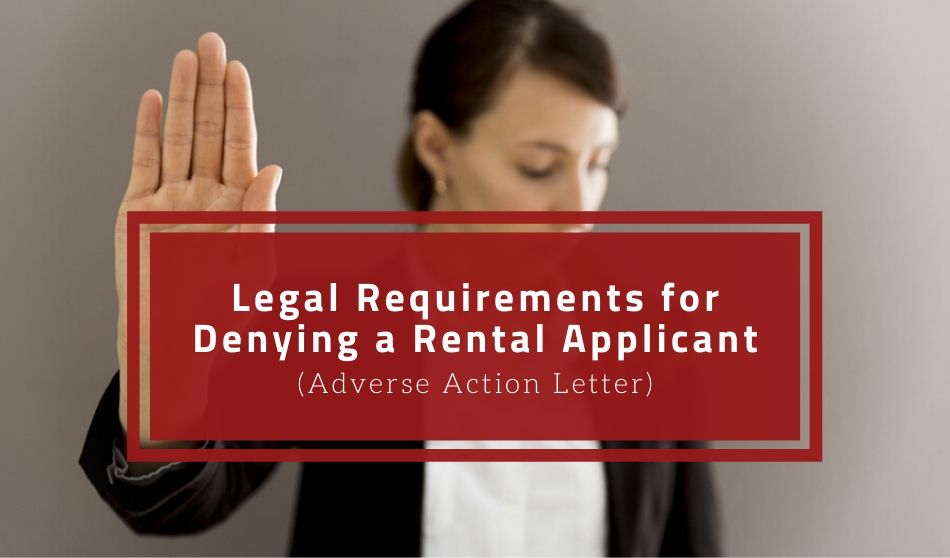
Property managers, landlords, and housing providers are legally required to provide an adverse action notice to rental applicants whose applications were denied during the tenant screening process, per the Fair Credit Reporting Act (FCRA).
Starpoint provides a free Adverse Action Notice for housing providers: Free Denial Letter
If you are a Rentec Direct Client you can use this template from Starpoint:
CLICK HERE TO USE THE STARPOINT TEMPLATE If you are declining the application based on information obtained within their TransUnion credit report.
Do I Need to Send an Adverse Action Notice to a Denied Rental Applicant?
According to the FCRA, when you look at a rental applicant’s consumer reports as part of your tenant screening process, you must send an adverse action notice to the rental applicant.
Consumer Reports for Tenant Screening
A consumer report is a background report that contains personal information on a consumer, like:
- Credit score
- Rental history
- Eviction history
- Credit history
- Criminal history
- Bankruptcies, liens, and judgments
The reports listed above are commonly used in tenant screening to determine if a rental applicant will be a qualified renter. So, if you use any type of consumer report during your tenant screening process, you must understand your requirements for providing an adverse action letter to your rental applicants.
Adverse Action in Tenant Screening
The Federal Trade Commission(FTC) and FCRA refer to the term adverse action, which may include denying a rental applicant housing or deciding not to renew a lease agreement, based on information found in a consumer report.
According to the FTC, other common examples of adverse action in housing include:
- Denying a rental application;
- Requiring a co-signer on the lease;
- Requiring a deposit that would not be required for another applicant;
- Requiring a larger deposit than might be required for another applicant; and
- Raising the rent to a higher amount than for another applicant.
If you deny a rental application for any legal reason and you accessed any type of consumer report as part of your tenant screening process, you must provide an adverse action notice to the rental applicant.
Remember to always use a legal tenant screening process that upholds requirements of the Federal Fair Housing Act, the FCRA, and other federal, state and local landlord-tenant laws.
Legal Tenant Screening
A housing provider can find a qualified renter by reviewing an applicant’s credit report and criminal record, verifying employment and income, checking references, and speaking to your past landlords to find out if they were a lease-breaking tenant.
You are not allowed to deny any rental applicants due to their race, religion, sex, familial status, disability, color, or national origin, under the Fair Housing Act.
To save yourself from any discrimination claims, you need to be able to tell a rental applicant exactly why they didn’t get approved for a rental property.
If you simply tell a rental applicant it’s not going to work out but you give them zero reasons, they can file a discrimination claim, even if you based your decision on legal reasons. If they happen to belong to a protected class, you could be in some legal trouble. (It’s called disparate-impact and you can learn more about it here: Are you breaking Fair Housing Laws unintentionally?)
The best way to deny a rental applicant is to send an adverse action letter or adverse action notice. In fact, if you use consumer reports as part of your tenant screening process, you must send an adverse action notice.
An Adverse Action Notice or Adverse Action Denial Letter
You need to provide an adverse action notice to your rental applicants if you accessed a consumer report on them. The most common consumer reports used in tenant screening are credit reports, criminal background reports and eviction history reports.
Adverse Action Notice for Credit Report Data
If an applicant is rejected based on information found on a credit report, the landlord must provide an Adverse Action Notice to the applicant.
An Adverse Action Notice tells the renter that he was denied due to information found on a consumer credit report, and gives contact information for the credit reporting agency used so the applicant can access the report too.
Starpoint provides a free Adverse Action Notice for housing providers: Free Denial Letter
If a renter contacts you saying that the information on their credit report is inaccurate, you should advise the renter to refer back to the Adverse Action Notice you provided and speak directly with the credit reporting agency to figure out how to make adjustments to their credit report.
Adverse Action Notice for Criminal Background Data
If you deny a rental applicant due to information found on a public record (like a criminal background report or eviction search) you need to provide the applicant with an adverse action denial letter and instructions on how they can obtain a copy of the report.
You do not need to provide a copy of the report, just tell the applicant which agency you used to access the report and who to contact to get a copy.
CLICK HERE TO USE THE CIC TEMPLATE If you are declining the application based on information obtained within their nationwide criminal search (report code: CRIM), or nationwide eviction search (report code: EVICTION).
Remember that it is illegal to use arrest records for tenant screening decisions, according to the U.S. Department of Housing and Urban Development.
Adverse Action Notice for Other Types of Consumer Report Data
Similar to a criminal record adverse action denial letter, you need to provide your rental applicant with an adverse action denial letter and instructions on how they can obtain a copy of the report for any type of consumer report data.
What if I denied a rental applicant based on information not on a consumer report?
The best way to ensure you are adhering to FCRA requirements is to give your rental applicant an adverse action notice, even if they were denied for reasons not on a consumer report.
A Housing Provider’s Responsibility
Property managers, landlords and housing providers are obligated to be familiar with and understand all laws related to owning, renting, leasing, and managing rental homes.
Property managers and landlords can follow legal requirements and protect themselves from discrimination claims by following these steps for denying a rental applicant the right way.
The information contained in this article is for educational purposed only and does not constitute legal advice. Please consult a licensed attorney familiar with laws for more information.





